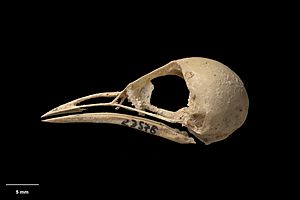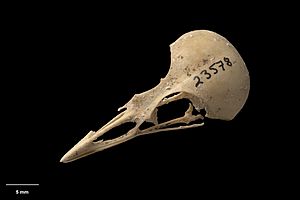South Island stout-legged wren facts for kids
Quick facts for kids South Island stout-legged wrenTemporal range: Late Pleistocene-Holocene
|
|
|---|---|
 |
|
 |
|
| Scientific classification |
|
| Kingdom: | Animalia |
| Phylum: | Chordata |
| Class: | Aves |
| Order: | Passeriformes |
| Family: | Acanthisittidae |
| Genus: | †Pachyplichas |
| Species: |
†P. yaldwyni
|
| Binomial name | |
| †Pachyplichas yaldwyni Millener, 1988
|
|
| Script error: The function "autoWithCaption" does not exist. | |
Script error: No such module "Check for conflicting parameters".
The South Island stout-legged wren (Pachyplichas yaldwyni), also known as Yaldwyn's wren, was a small bird that lived only in New Zealand. It is now extinct, which means it no longer exists anywhere in the world. This wren belonged to a special group of birds called New Zealand wrens, which are unique to New Zealand.
Contents
Discovering the Stout-Legged Wren
Scientists found the first remains of this bird on September 29, 1983. They found a bone from its leg, called a tarsometatarsus, in a place called Honeycomb Hill Cave. This special bone is kept at the National Museum of New Zealand.
Why the Name "Yaldwyn's Wren"?
The bird was named Pachyplichas yaldwyni to honor Dr. John Yaldwyn. He was the director of the National Museum of New Zealand in Wellington. Dr. Yaldwyn helped a lot with studying ancient birds.
What Did This Wren Look Like?
The South Island stout-legged wren was the biggest of all the New Zealand wrens. It was quite heavy for a wren. Its body shape shows it was very good at living on the ground. It probably could not fly, or could only fly a very short distance.
When Did It Live?
Scientists used a method called radiocarbon dating to find out when these birds lived. They found that the wren lived between 25,000 years ago and 1,000 years ago.
Why Did It Disappear?
This wren became extinct after the Polynesian ancestors of the Māori arrived in New Zealand. They brought with them the kiore, also known as the Pacific rat. These rats likely hunted the flightless wrens and their eggs, leading to the wren's disappearance.
Where Did This Wren Live?
The bones of the South Island stout-legged wren have only been found on the South Island of New Zealand. It seems to have had a "species pair" with a similar bird called the P. jagmi, which lived only on the North Island.
Its Home and Neighbors
Scientists found the South Island stout-legged wren's bones with four other types of New Zealand wrens. This means it lived alongside them. It likely had a different "ecological niche," which means it ate different things or lived in slightly different parts of the forest. This allowed them all to live together without competing too much. The wren lived in lowland forests with podocarp trees and broadleaf trees. It also lived in alpine tundra scrubland higher up in the mountains.
 | Shirley Ann Jackson |
 | Garett Morgan |
 | J. Ernest Wilkins Jr. |
 | Elijah McCoy |

